The reaction to Robin Williams’ death has been unlike any celebrity death I can remember. We all knew Whitney was going to go, and Michael Jackson’s end was as expected as it was bizarre. With Williams there seem to be few mysteries. It was a battle, and he lost. Yet the shock of his tragic decision seems to have transcended our celebrity autopsy culture with its essential question: how can someone who gave so much, who had so much to give, have turned away from the light with such finality?
It’s a question we’ve all tried to answer at one point.
It’s also opened up a floodgate of frank talk about depression. As many have pointed out, there’s a difference between the blues—temporary depression we’ve all suffered from at one time or another—and the deep, clinical depression that killed Williams and Kurt and Plath and so many others.
Depression, and its ugly twin, substance abuse, are both hazards of the creative life. My Facebook feed has been flooded with creative people discussing their own depression, sometimes with courage, sometimes with dread. Neither is the “right” response. This is a daily battle we all face, the important part is to get through, to know you are not alone, to find the light in what seems like an endless darkness. We get by in measures that are appropriate.
Joshua Hale Fialkov has a much linked to post that expresses all this much better than I can. Fialkov’s own battle is with migraines, not depression but the battle is similar.
There is never enough. Never enough time, never enough money, never enough success, never enough praise, never enough sales. Never enough. That’s part of the life I’ve chosen. We struggle to find that thing that makes us feel satisfied, that gives us joy, but, the truth is that the joy is fleeting. The feeling of being ‘full’ only lasts for a few moments before the hunger returns.
This is the life of an artist. This is the life of anyone who aspires to be greater than they are.
This is unattainable. This is the bottom line to life, from top to bottom from the most successful man on earth to the weakest child on the playground. Nothing you ever do will be enough.
The talking is good. I had a long talk with one of my oldest friends I don’t speak with as much as I should who had dated Williams back in the day. Some of her stories were hilarious but they are hers to tell. So many people have shared stories of Williams shopping in their comics stores or book stores (the guy liked to read!), or meeting him at charity events. All the stories are of a kind man, a giving man. I dread the day when the celebrity autopsy horror stories come out…for now keeping these kind, human moments alive helps with getting through.
I’ve had a case of the blahs myself of late. Not being productive enough, things I let slide, the dog days of August, post Comic-Con let-down. Nothing I haven’t felt before—I’ve learned to be pretty resilient in my life. Like I said, we all have good days and bad days. Last night I got together with two industry colleagues and in a few hours of smart, funny talk about life and comics—moments where I never looked at my cell phone—everything was OK again. On to the next battle.
The communal mourning and questioning is part of the healing. I almost feel like the good from all the sharing has overwhelmed the sadness. Life is both beautiful and terrifying, but its beauties and terrors are best experienced knowing you are not alone in this glorious muddle. You are not alone. We are not alone.
PS: Yes I forgot Popeye in my first post about Robin Williams. Which sucks because despite it being a horrible flop, it’s a sweet, wonderful movie— written by Jules Feiffer! Wacky as hell, a glorious muddle. And a role, like so many others, that Williams was born to play.


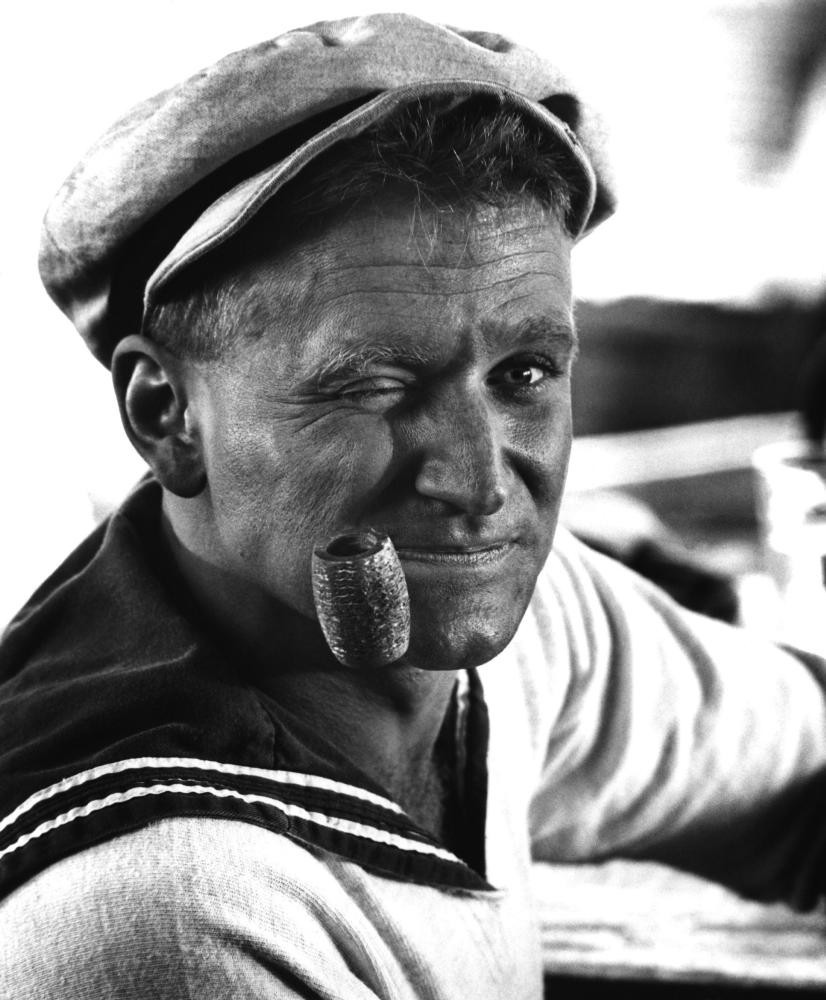
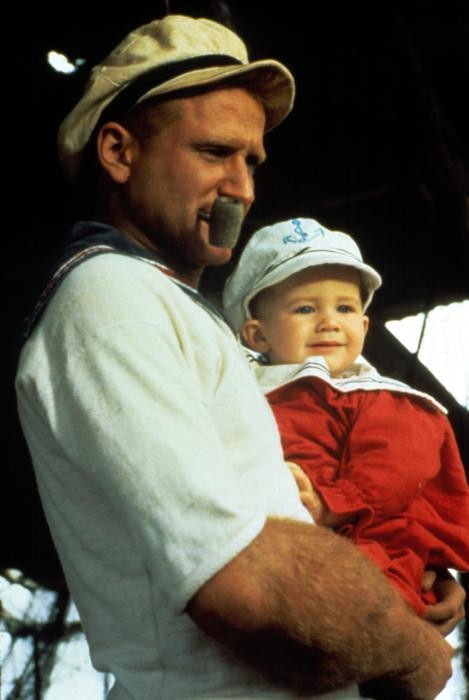
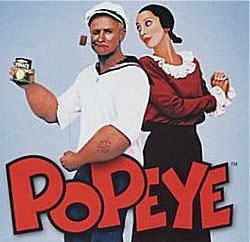
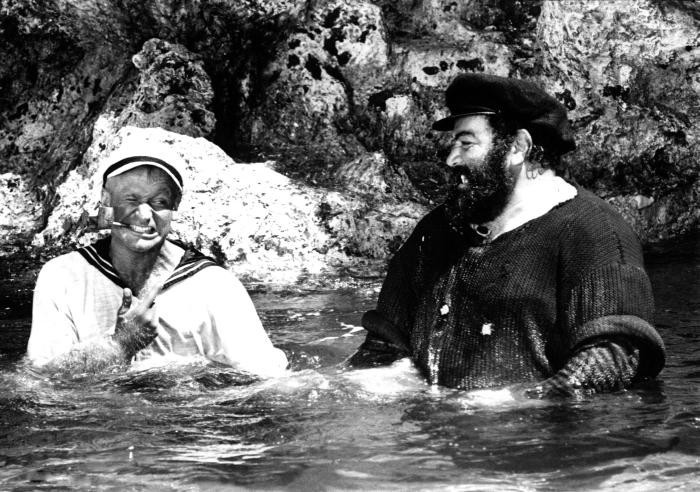
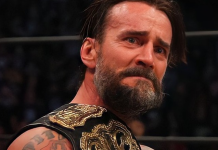




“The mass of men lead lives of quiet desperation. What is called resignation is confirmed desperation. From the desperate city you go into the desperate country, and have to console yourself with the bravery of minks and muskrats. A stereotyped but unconscious despair is concealed even under what are called the games and amusements of mankind. There is no play in them, for this comes after work. But it is a characteristic of wisdom not to do desperate things.”
Henry David Thoreau
or “The Voiceless” by Oliver Wendell Holmes
Sometimes, the world laughs with you.
Sometimes, God laughs at you.
If we are lucky, we are not alone at the end.
And so it goes…
Torsten, did you just quote Oliver Wendell Holmes at us?
Yes, if there is one “positive” to come out of this, it’s the fact that people seemed to have become more sensitive to and understanding about depression. In many cases, substance abuse is a by-product of depression and other related clinical issues, in that it is sometimes an attempt at “self-medication” by the user.
An aside: Popeye is a charming film, but in his recent memoir, Feiffer says filmmaker Robert Altman basically went to Malta so that he could film whatever he wanted with minimal interference from the studio (I think he pretty much threw out the script). No doubt partly because of this, he didn’t have sufficient money to complete the film in an adequate manner. Williams went in believing this would be a franchise, but it didn’t quite turn out well, through no fault of Williams or any of the other performers.
No, I quoted Thoreau.
I suggested Oliver Wendell Holmes’ poem.
The next three lines are me.
The last line is Harlan Ellison.
The Popeye movie suffers from a peculiar problem fairly common in comics adaptations (it’s endemic on french comics adaptations, for exemple). I got so caught up trying to emulate the look and feel of the source material that it forgot how to entertain.
Looking at these still pictures, or even at a few short clips, the movie appears to be perfect. Sadly the whole thing is a mess.
And, indeed, by no fault of the performers. Robin Williams is the perfect Popeye and Shelley Duvall was BORN to play Olive Oyl!
It’s quite sad, really. I wish they could have done a second, better movie with the same cast.
Popeye has its problems, but it’s the first time I ever remember being awestruck by Robin Williams. Popeye’s constant muttering is an amazing stream-of-consciousness running commentary that I have to believe was largely ad-libbed. And even if it was scripted, the sheer enormity of maintaining that through dozens of takes and days and days of shooting is a feat of monumental proportions.
As someone who tried to end his own life, unplanned, just this May, driven by unrelenting bullying thoughts, and you listen to the thoughts… this Robin Williams news has hit me so hard. It makes you think… how everyone is struggling, really, no matter your status or success in life. I wish I could’ve stopped him from what he did. I’ll miss him.
“The last line is Harlan Ellison.”
Actually, Torsten, “And so it goes…” belongs to Kurt Vonnegut and his novel Slaughterhouse Five, used whenever someone Billy Pilgrim knows dies.
Popeye is one of the most polarizing movies ever made. People tend to love it or loathe it. I love it, and have ever since I saw it in 1980. And this isn’t childhood nostalgia talking; I was a college student at the time.
I’ve given up on debating Popeye. You’re either on Altman’s (and Feiffer’s) wave length, or you’re not.
As for the claims that Popeye was a major box-office disaster, it was actually the 12th highest grossing film of 1980, grossing just under $50M (which was real money then). It grossed more than Urban Cowboy, The Shining, Caddyshack, Friday the 13th, The Elephant Man, Flash Gordon, Raging Bull, Xanadu and Fame. It’s probably earned well over $100M by now.
It’s only a bomb in relation to expectations. Disney and Paramount wanted a hit on the level of Star Wars. They apparently didn’t know that Altman was not the guy to hire when you want a movie that will appeal to everyone.
Comments are closed.